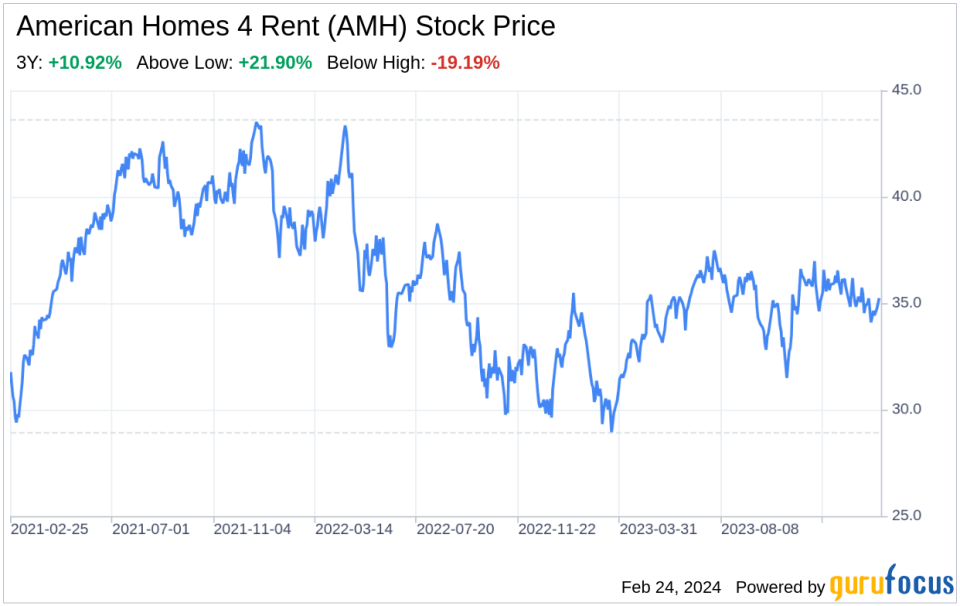Decoding American Homes 4 Rent (AMH): A Strategic SWOT Insight
Strengths highlight AMH's unique internal development program and strong brand identity.
Weaknesses consider the challenges in renovation costs and competition for property acquisitions.
Opportunities emphasize the potential in demographic shifts and long-term housing demand.
Threats address economic factors and regulatory changes that could impact AMH's operations.
On February 23, 2024, American Homes 4 Rent (NYSE:AMH), a leading real estate investment trust specializing in single-family homes, released its annual 10-K filing, offering a comprehensive view of its financial health and strategic direction. The company's focus on acquiring, operating, and leasing single-family homes across the United States has positioned it as a significant player in the residential rental market. With a portfolio concentrated in high-growth urban markets, AMH has demonstrated a consistent ability to generate rental revenue through its strategic acquisitions and development programs. The financial tables within the filing reveal a robust balance sheet, with a disciplined approach to leveraging and capital allocation that supports both dividends and capital appreciation for shareholders.

Strengths
Integrated Development Program and Brand Recognition: AMH's fully integrated internal development program, AMH Development, is a cornerstone of its strength. This program, focused on constructing "built-for-rental" homes, leverages the company's existing property management platform and is tailored to long-term renters. The homes feature maintenance-resilient designs and desirable amenities, which are strategically developed based on proprietary data analytics. This approach not only enhances AMH's portfolio with high-quality assets but also supports higher rental rates and tenant satisfaction. Furthermore, the rebranding to "AMH" in January 2023 has reinforced the company's commitment to innovation and sustainability, contributing to a nationally recognized brand that is synonymous with quality and value. The brand strength is a key differentiator in attracting and retaining residents, as well as supporting premium pricing.
Geographical Diversification and Property Management: AMH's geographically diversified portfolio mitigates risks associated with market-specific adversities. The company's presence in high-growth markets like Dallas, Atlanta, and Charlotte positions it to capitalize on steady population growth and strong rental demand. This diversification strategy is complemented by an efficient property management system that balances centralization with local expertise. The in-house management enables AMH to optimize rental revenues, manage expenses effectively, and achieve economies of scale. The centralized corporate functions and local property management teams work in tandem to provide a standardized brand experience and maintain direct tenant relationships, which are critical for long-term success.
Weaknesses
Renovation and Maintenance Challenges: AMH's business model involves acquiring properties that often require renovation. While this strategy can lead to enhanced property values and rental income, it also presents challenges. Renovations can be subject to unforeseen costs, delays, and quality issues, which can impact the company's financial performance. Additionally, the ongoing maintenance and repair work, increasingly performed by in-house employees, requires significant management oversight and can lead to variable costs that may affect profitability. The reliance on independent contractors and the risks inherent in property renovation, such as cost overruns and labor shortages, are potential weaknesses that AMH must manage carefully.
Competition for Property Acquisitions: The single-family rental market is highly competitive, with private buyers, investors, and other REITs vying for similar properties. This competition can drive up acquisition costs and limit the number of suitable investment opportunities available to AMH. The company's focus on homes built after 2000 with specific characteristics may further narrow the field of potential acquisitions, potentially impacting growth. While AMH's established acquisition platform and market knowledge provide some competitive advantage, the intense competition for target properties remains a significant challenge.
Opportunities
Demographic Shifts and Housing Demand: AMH is well-positioned to benefit from demographic trends, including the millennial generation entering family formation years and the national housing shortage. These factors are expected to drive long-term demand for single-family rental homes. Additionally, the surge in remote work has increased the desire for larger living spaces, which plays to AMH's portfolio of single-family homes. As mortgage rates rise, making homeownership less affordable, the rental market is likely to see increased demand, presenting AMH with opportunities to expand its tenant base and increase rental income.
Strategic Market Expansion: AMH's disciplined growth strategy includes evaluating new markets for potential investment and establishing operations. By leveraging its proprietary analytics and experienced land acquisition team, AMH can identify and enter emerging markets that offer attractive yields and capital appreciation. The company's focus on markets with above-average household incomes and desirable amenities positions it to attract tenants with strong credit profiles, which can lead to higher occupancy rates and stable rental income streams.
Threats
Economic and Inflationary Pressures: High inflation and economic uncertainty can adversely affect AMH's operating results. Inflationary pressures increase operating and development costs, including labor, materials, and utilities. While AMH's leases allow for some cost pass-through to tenants, there is a limit to how much can be offset by rental increases. Additionally, tenants may face higher living expenses, potentially leading to increased default rates. Economic downturns can also reduce rental demand and occupancy rates, impacting AMH's revenue and profitability.
Regulatory Changes and Property Taxes: The real estate industry is subject to extensive regulation, and any changes can significantly affect AMH's operations. Restrictions on rent increases, tenant screening, evictions, and tenancy terminations can limit AMH's operational flexibility and profitability. Moreover, property taxes, a substantial component of operating expenses, have been increasing. If AMH cannot raise rental rates to offset these increases, its
This article, generated by GuruFocus, is designed to provide general insights and is not tailored financial advice. Our commentary is rooted in historical data and analyst projections, utilizing an impartial methodology, and is not intended to serve as specific investment guidance. It does not formulate a recommendation to purchase or divest any stock and does not consider individual investment objectives or financial circumstances. Our objective is to deliver long-term, fundamental data-driven analysis. Be aware that our analysis might not incorporate the most recent, price-sensitive company announcements or qualitative information. GuruFocus holds no position in the stocks mentioned herein.
This article first appeared on GuruFocus.
